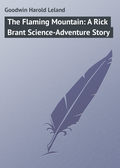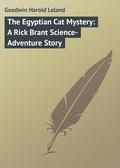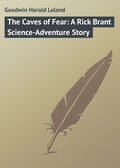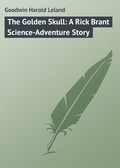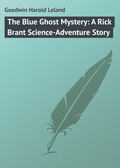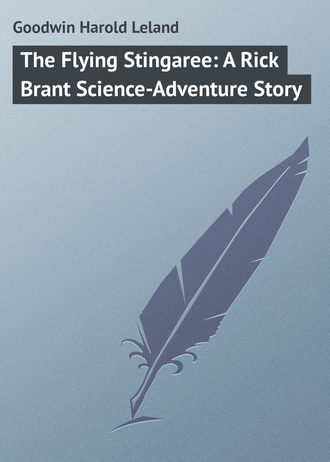
Goodwin Harold Leland
The Flying Stingaree: A Rick Brant Science-Adventure Story
CHAPTER V
The Face Is Familiar
The Bay Gourmet was all that its outside appearance promised. A waiter, elderly and courteous, his voice soft with the Eastern Shore accent, led them to a table in a main dining room that was like something out of early American history, Maryland style. The Maryland colony had not been poor, and many of its settlers had been of the English nobility. They had brought with them furniture, paintings, and chinaware from England and France, and their homes were gracious and livable.
The restaurant followed the pattern. Rick wouldn't have been surprised to see the ghost of Lord Baltimore walk through one of the arches.
The boys pored over the menus and finally settled on crab gumbo, clam fritters, and crab imperial. While they waited, Rick opened the subject that was on his mind. "How does a stingaree fly?"
Scotty shrugged. "Easy. He climbs to the top of a tall tree, spreads his wings, and takes off. He flaps his wings to gain altitude. He steers with his tail."
"I'm serious," Rick said sternly, his eyes twinkling.
"So am I. Alternate method: the stingaree climbs on a fence and lassos a passing airplane. Or catches a ride on an eagle's tail feathers. Take your choice."
"I've got a better way. The stingaree poses for his picture. The picture is used as a model for making a kite, probably of black plastic. The kite gets flown in the wind."
Scotty stared. "Maybe – just maybe – you've got something there. The stingaree shape would make a good kite. Could what you saw have been a kite?"
"It's possible." Rick nodded. "The wind was funneling down the creek pretty fast, and it would have carried a big kite. There's only one small difficulty. Why launch a kite that has no string?"
"You certain it didn't have a string?"
"In that wind, the string would have had to be a cable. I'd have seen it, and maybe felt it. The kite – stingaree, that is – just missed. Of course, the string might have broken."
"There's another small difficulty," Scotty said thoughtfully. "If it was a kite, where was it launched and why?"
"Up the creek somewhere. We don't know what's up there."
"True. From the looks, I'd say not much. Maybe some opossums and muskrats, which don't launch kites."
Rick spread butter liberally on a hot biscuit. "We can always take a look."
"We can. In Steve's boat, the creek would be only a few minutes away."
Rick savored the biscuit and took another bite that finished it. "I could eat a ton of these. What else would make a stingaree fly?"
Scotty accepted a pitcher of honey from the waiter and poured a disgraceful amount on a biscuit. "How about some kind of experimental aircraft?"
Rick shook his head. "The stingaree was vertical. An experimental plane in that position would have to be rising straight up, and this creature was traveling almost horizontally, with the wind. Besides, I heard no motor or any kind of power plant."
"You're as lucid as lamplight, ol' buddy. You explain everything – except what made that stingaree fly."
Rick grinned wryly. "I'll never get a swelled head with you sticking pins in it."
"Only carrying out my proper function," Scotty said virtuously.
The first course had arrived. Crab gumbo turned out to be spicy, hot, and very, very good.
"I may decide to live here," Rick said as he spooned up the last mouthful.
"I'm a native already," Scotty stated. "The Chesapeake Bay is my home, if the rest of the meal lives up to the soup."
The clam fritters were light, crisp, and succulent. "Meet a brand-new Marylander," Scotty announced.
Rick started to reply, then stopped as a party of three entered the dining room and were shown to a table nearby. He knew one of the men, but he couldn't remember where they had met.
"Scotty," he said softly, "look around at the group that just came in. Who's the man in the plaid jacket? I know him, but I can't remember."
Scotty's napkin "accidentally" fell to the floor. He had to turn to pick it up. When he straightened, he shook his head. "The face is familiar, but I can't place it."
Rick studied the man through half-lowered lids, not wanting to be rude by staring openly. The familiar face was lean, and lined. It was not a pleasant face, although its owner would be described as a "distinguished-looking man of middle age." The lips were not especially thin, but they were tightly held. The chin was firm, with a shadow of beard even though the man looked freshly shaven. His hair was crisp, wavy, and pure white.
"Could be of French or Italian ancestry," Rick said. "Or, maybe, Spanish or Portuguese. Anyway, I'd vote for Southern European."
"On the button," Scotty agreed.
Rick's eyes dropped as the man looked their way. The eyes were dark brown, he saw, with heavy lids. The eyebrows, in startling contrast to the white hair, were dark.
The boy looked up again, his glance guarded. The man was smartly, but conservatively dressed, in dark-blue slacks, white sport shirt open at the collar, and a linen sport jacket of subdued plaid, much like those affected by some Ivy Leaguers.
The other two men were not familiar. One was almost bald, with a wisp of sandy hair combed in a pitiful and useless attempt to conceal the baldness. He wore glasses with clear plastic frames. They sat on a nose that could have served as a golf-ball model. His lips were almost nonexistent, and his chin receded so far that Rick wondered why he didn't conceal it with a beard. He seemed like a complete non-entity. In contrast to the white-haired man's style of dress, the nondescript man wore a rumpled black suit of synthetic fabric, a regular white shirt, and a tie that a color-blind old aunt might have given him for Christmas two decades past.
The third man was the largest of the three, with an expressionless face and eyes that never stopped moving. He sat motionless in his chair, apparently completely relaxed. Rick knew that the relaxation was deceptive. Steve Ames at times looked relaxed like that, but it was the same kind of quietness one finds in a coiled spring that has not yet been released. The man had brown hair, light-brown eyes, and a heavy tan. He spoke only twice while Rick watched, and then only to give orders to the waiter. The other two men talked steadily, but in such low tones that the boys could not hear words.
The crab imperial arrived, and the riddle of the familiar face was forgotten in a new taste treat. After one luscious bite, Rick said, "I'm going to bring the folks here and order a duplicate of this meal. They'll go crazy."
Excellent food was a tradition in the Brant household. Mrs. Brant was a superb cook, and both she and Hartson Brant had taught the Spindrift young people to appreciate a well-prepared dish.
"I'll order the same thing just to keep them company," Scotty offered.
"Generous, always generous," Rick replied. "You'll eat the same thing even if you have to force it down."
"I'll do just that," Scotty agreed. "Remember where you've seen yonder diner?"
Rick shook his head. "Not yet. It's an odd trio. He's the dominant one in the group. The bald one looks like a servant, and the big one like a police dog on guard."
"Bodyguard?" Scotty asked quickly.
"Maybe. Or, perhaps, a chauffeur. It's hard to say."
"Do you suppose the white-haired man is just a familiar type and we've never seen him before?"
"No. It isn't that. I know I've seen him before, but I can't tell you where or when."
The boys finished the meal with a scoop of lemon sherbet and rose reluctantly. "We'll be back," Rick promised.
"That we will," Scotty echoed.
The old waiter bowed them to the door. As they were leaving, Rick paused. "Do you know that white-haired man at the table near us?"
"Why, sir, that's Mr. Merlin. Summer folks, you might say. He bought one of the old mansions. This is his second summer with us."
"Which one of the old mansions?" Scotty asked.
"Calvert's Favor. It's in the guidebooks, sir. We have copies for sale if you'd like one."
"We have one," Rick replied. "Thank you."
"Not at all, gentlemen. Hurry back."
The boys walked into a lovely summer night, with a newly risen moon, near fullness, floating just above the horizon. By unspoken agreement, they put the top down on Steve's convertible. Rick was just snapping it in place when he sensed someone standing next to him. He turned, to face the big man of the trio.
The man got to the point without preliminaries. "You were asking the waiter about Mr. Merlin."
"We thought he looked familiar, but we couldn't place him," Rick replied. "We meant no discourtesy."
"I'm sure you didn't," the man said smoothly. He didn't smile, even though his voice was pleasant enough. "Mr. Merlin is a very prominent man. He comes down here to get away from people. Naturally, he doesn't welcome inquiries. I'm sure you understand."
"We have no intention of intruding," Rick stated coolly. "As I said, he looked familiar. We merely asked out of curiosity."
"You're not local boys." It was a statement.
"No. We're visitors."
"The local people have learned not to ask questions about Mr. Merlin. I suggest you follow their example." The man turned and walked back into the restaurant.
The boys stared after him, openmouthed.
"If that poor soul only knew," Scotty said, "he picked the best possible way to arouse our curiosity."
"I haven't been warned so politely in a long time," Rick agreed. "Come on, son. Let's head for Martins Creek." He slid behind the wheel while Scotty got into the passenger side.
Rick started the car and listened to it purr for a moment. "I noticed that Steve has quite a few books about the Eastern Shore on his bookshelves," he said casually.
"So did I. Including one called Tidewater Maryland. Lots of pictures of the old estates in that one."
"Be interesting if there was a picture of Calvert's Favor, wouldn't it?"
"Interesting and maybe informative. Well, are we going to sit here all night?"
"Nope. We're going to Steve's. Looks as if we have a small research project."
"To be followed by a second project," Scotty added. "First we read up on Calvert's Favor, and then we find it and look it over."
Rick grinned. "Nobody warns Scotty with impunity."
"But nobody!" Scotty said cheerfully.
CHAPTER VI
The Saucer Sighters
"We shoot a line straight north," Rick explained, "for a distance of about twenty miles. Then we start asking questions. If we get affirmative answers, we head north again for another ten miles and repeat the process. We do this until we come to an area where saucers have not been sighted. Okay?"
Scotty nodded. "Okay. There is only one tiny flaw in this plan. If we head straight north, we drop Steve's car into the Little Choptank. If we cross that safely, we'll get wet in the main Choptank."
Rick sighed. "If there is anything I detest, loathe, and despise, it is people who get up in the morning feeling full of humor. We will go to Cambridge, missing the Little Choptank, and cross the Choptank on the bridge. Route 50 goes almost straight north. Is that more precise and acceptable, Donald?"
"It is indeed, Richard. I'm a stickler for accuracy."
"You're a stickler in the mud. Let's get a notebook and start traveling."
A conference after dinner the night before had resulted in a plan of action. The boys had decided to reduce all the rumors about flying saucers to statistics that could be examined to see what elements the various sightings had in common. The way to obtain the statistics was through interviews.
The problem of the white-haired man with the familiar face still remained. Steve's books had disclosed that Calvert's Favor was famous, that it had been so named by the original settler because he had been granted the land by Lord Calvert, that it had changed hands only twice in more than a century. What the books didn't give was its location. The place was identified only as "a quiet creek, entirely within the original land grant." There was no mention of a Calvert Creek in the vicinity. They decided to put the question of its location aside until Steve's return.
It was a lovely morning. The convertible hummed smoothly over the blacktop roads to Cambridge, onto Route 50, across the Choptank River and north. Rick braked to a stop as the highway met the turnoff to Easton. "Think we're far enough north?"
Scotty had been consulting a road map. He shook his head. "Not yet. Easton is almost due east of Knapps Narrows, and we know the saucers have been sighted there. Better go on to Wye Mills."
"Okay." The road was dual-lane cement, now, and Rick relaxed while the car sped northward. "Odd name, Wye Mills. Lots of Wyes around here. Three Wye Rivers on the chart, a Wye Landing, and a famous old Wye Oak."
"Sounds like a song," Scotty said. "Wye, tell me Wye, are there saucers in the sky – "
"Please," Rick protested, "I'm in pain."
Route 50 turned at Wye Mills, leading to the Chesapeake Bay Bridge that crossed the bay to Annapolis. There was a gas station and lunch stand at the intersection. Rick pulled in and drifted up to the gas pump. "Fill it up, please. Any bottles of Coke around?"
"In the machine." The attendant pointed to the red automatic vendor.
The boys equipped themselves with Cokes and walked back to watch the attendant fill the tank. "We must be somewhere near where all those flying saucers were sighted," Rick remarked.
The attendant looked up. "Farther south. Never heard of anyone this far north seein' one. They see plenty down toward Cambridge. Ask me, they're seein' spots in front of their eyes."
The boys exchanged glances. When the car was ready, Rick turned and started south again. "See any stores on the way where we could ask again?"
"There's a restaurant. I saw two grocery stores, too, but from the way the attendant talked, we'll have to get closer to Cambridge." Scotty was making a note in their notebook.
Five miles back toward home, Rick stopped at another gas station and asked the attendant to look at the oil. None was needed, so the boys bought another pair of Cokes and engaged the man in conversation.
"Ever see any flying saucers in this area?" Rick asked.
"Nope. My brother did though, late one afternoon when he was on duty."
Scotty took out the notebook. "We're trying to get some information about them for a story we're writing. Do you remember when it was?"
"Let's see. I was workin' in the evenin' that day, so it must have been a Saturday. Last month, it was. Oh, I recall it now. Next day I took the kids to my mother's. It was her birthday. That would make it the tenth."
"Where was your brother when he saw it?" Rick queried.
"Pumpin' gas. Right here. He said it sort of came up over the trees, glittering like fire." The attendant pointed to a patch of trees down the road. The direction was almost directly southwest.
Scotty scribbled in the notebook. "Any other details you remember? What time in the afternoon was it?"
"Between four and five. Can't say exactly. He was still buzzin' when I came on duty at six. Wanted to call the newspapers, but I talked him out of it. People would think he was a fool."
"Did you?" Rick asked quietly.
"Nope. I know Chick. He's got a straight head on him. It may not have been a flyin' saucer, but you can bet it wasn't anythin' common, or anythin' he'd seen before."
"Score one," Scotty said triumphantly as they drove off.
"One flying saucer doesn't make a Martian invasion," Rick reminded him. "Let's keep it up."
By lunchtime they had interviewed a dozen people who claimed to have seen flying saucers. All details of the sightings had been noted in Scotty's book. During lunch, at a small restaurant in the old town of Oxford, they scored three more times after interviews with fishermen.
After lunch, they crossed the Choptank and headed south to the little town of Vienna. From there the route led to the shore town of Elliott, back to Vienna, and past the corner of Delaware to Salisbury, a good-sized town on the Maryland Eastern Shore.
There was a newspaper office in Salisbury. A chat with the editor and a quick skim through the back files added more data to the growing list. Rick had a hunch there was a pattern shaping up, but he could not be sure until the information was all laid out for examination.
By the time the boys met Steve at the small airport, both Rick and Scotty had writer's cramp, and the notebook was nearly used up. They had recorded over half a hundred sightings.
Steve listened to a report of their day with an appreciative smile. "Nothing like a mystery for keeping you two out of mischief," he told them. "Want to eat out? Or cook a steak in the yard?"
"Eat out," Scotty said promptly.
"We can get steak at home," Rick added. "But not Chesapeake Bay clam fritters or Maryland crab cakes."
Steve had a favorite place of his own, a small, nondescript joint called "Louie's Crab House" up the Choptank River, near the town of Denton. There, on wooden trestle tables covered with brown wrapping paper, he introduced them to a favorite Chesapeake Bay pastime known as a "crab feast."
The waiter set wooden blocks in front of them, with a round piece of hardwood, a fork, and a sharp paring knife. A stack of paper napkins was supplied, and individual pots of melted butter completed the setting.
The boys waited impatiently, hungry, but trusting Steve's word that the result was worth the wait. The waiter reappeared carrying a huge tray, stacked with a towering pyramid of whole crabs, steaming and red, coated with the spices in which they had been cooked. Placing the tray on the table, the waiter asked, "Anything else?"
Scotty said, dazed, "I don't believe there's anything else left in the kitchen. We have all the crabs in the world right here."
"Only three dozen," the waiter said. "Jumbos, of course. You want anything, you yell."
Unidentified flying objects were forgotten as Steve initiated them into the proper method of eating fresh crab. It turned out to be quite an art, but one that they mastered quickly. Soon all three of them were munching succulent back-fin crab meat drenched in fresh butter. The wooden block served as an anvil, and the round hardwood piece as a hammer for cracking claws. The paring knife was used for trimming and for scooping out delicious bits of meat. The fork was utilized to persuade small tidbits to leave their shell cages. Three or four napkins were used between each tidbit to mop buttery hands, and even chins, down which the butter sometimes dripped. It was a feast, indeed.
"If I hadn't been a heavy eater before, I'd be one after this," Scotty observed happily.
"Beats hunting flying stingarees," Rick agreed. "Pass another crab, please."
Not until the table had been cleared by the waiter, who simply removed the utensils and tray, then wrapped up all the shells in the brown paper and carried it off, did the conversation return to the mystery.
Rick hadn't told Steve of last night's meeting with the white-haired man or of the thinly veiled warning. He described them now in detail.
"Odd," Steve said. "This familiar face needs identifying. No normal person worries about anyone asking casual questions. That's a sure mark of insecurity. In other words, the man is afraid. People who are afraid often have something to hide. Do you have any reason to think he may be tied up with the flying stingarees or saucers?"
"None at all," Rick answered.
"Do you know where Calvert's Favor is?" Scotty asked. "The location wasn't given in your books. There was quite a lot about the plantation house."
"No, never heard of the place. But we'll find out when we pass through Cambridge. I know a man there who knows everything about this area." Steve held out his hand. "Let's see your notebook."
Scotty handed it over. The young agent leafed through it rapidly. "That's some list. If I had any doubt that people were seeing things, it's gone now. How are you going to arrange the data?"
"In tables, and on a map," Rick explained.
"Fine. We can do it tonight. Want anything else?"
Scotty groaned. "I couldn't even drink a glass of water."
"Same here," Rick agreed.
"Then let's leave the crabs behind and take a ride."
On the way back to Cambridge, Steve Ames mused aloud. "You know, it's an odd world. A few years ago there were flying saucer reports by the dozen. Each one was given lots of newspaper space. The Air Force conducted investigations. Then flying saucers got unpopular, the Air Force closed its project, and the newspapers wrote a funny story every time a report came in. Now we have a rash of sightings in one small area. People talk about it, but no one gets excited. The authorities brush it off as just hokum. Yet, your investigation today shows that people are seeing something, even if we don't know what."
Rick nodded thoughtfully. "What's even odder is that a well-known man disappears, people search for him for a couple of days, and then do nothing but talk about it. The police aren't even interested, so far as we can tell."
Steve laughed. "You're right. But look at it in another way. Assume you're the local policeman. Someone rushes in and tells you that Joe Doakes has been carried off by a flying saucer. You don't believe in flying saucers, but you know Doakes. You investigate. His boat has been found, but his body is missing. What do you assume? That he was really toted off by some mysterious object? Nope. You assume he was hurt or killed falling out of the boat. You know that sharks come into the bay and sometimes swim up creeks. You figure that the currents sometimes act in odd ways, depending on the winds. You figure a dozen natural kinds of things, none connected with mysterious flying objects. You call a coroner's jury, and not a man on it is willing to say for the record that he believes in flying saucers. What happens?"
"Case closed," Scotty said slowly, "because the body isn't around. No proof of death, or even of accident. Pending proof of death – meaning the body – the jury finds that Joe Doakes is missing under mysterious circumstances and may have met with death or an accident by misadventure while engaged in his lawful business of crabbing."
"That's about it," Steve agreed. "It isn't really odd when you look at it that way. But you can bet the case isn't closed. It's just inactive, until something turns up. Remember there's no detective squad in a small town."
There was a combination gas station and store on the outskirts of Cambridge. Steve drove in and honked the horn. A young boy looked out of the store and called, "Howdy, Steve. Want gas?"
"Not tonight, Jimmy. Ask your grandfather where Calvert's Favor is located, will you?"
The boy came out of the store and walked toward the car. He was a freckle-faced towhead, with a grin wider than the Choptank River. "Heck, Steve, I don't have to ask gran'pop that. Everybody knows where Calvert's Favor is located."
"Not everybody," Steve returned. "I don't. How about letting us in on the secret, Jimmy?"
"It's no secret. Everybody around here knows it's located across the river from you. It's at the head of Swamp Creek."



